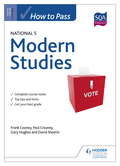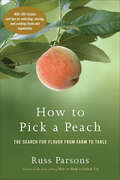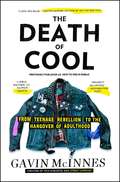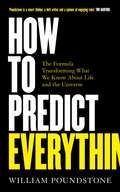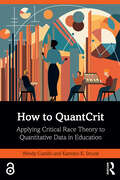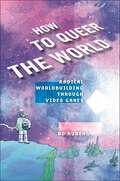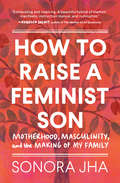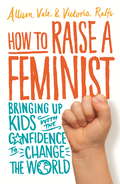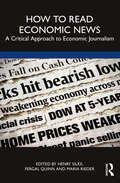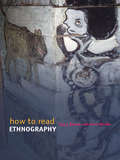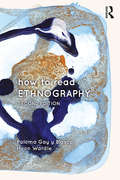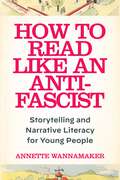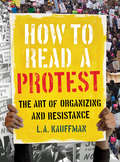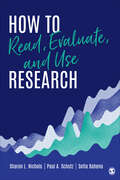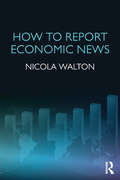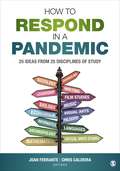- Table View
- List View
How to Pass National 5 Modern Studies
by Frank Cooney Paul CreaneyGet your best grade with the SQA endorsed guide to National 5 Modern Studies.This book contains all the advice and support you need to revise successfully for your National 5 exam. It combines an overview of the course syllabus with advice from a top expert on how to improve exam performance, so you have the best chance of success. Refresh your knowledge with complete course notes Prepare for the exam with top tips and hints on revision technique Get your best grade with advice on how to gain those vital extra marks
How to Pick a Peach: The Search for Flavor from Farm to Table
by Russ Parsons“Equal parts cookbook, agricultural history, chemistry lesson and produce buying guide, this densely packed book is a food-lover’s delight.” —Publishers Weekly (starred review)Critics greeted Russ Parsons’ first book, How to Read a French Fry, with raves. The New York Times praised it for its “affable voice and intellectual clarity”; Julia Child lauded it for its “deep factual information.”Now in How to Pick a Peach, Parsons takes on one of the hottest food topics today. Good cooking starts with the right ingredients, and nowhere is that more true than with produce. Should we refrigerate that peach? How do we cook that artichoke? And what are those different varieties of pears? Most of us aren’t sure. Parsons helps the cook sort through the produce in the market by illuminating the issues surrounding it, revealing intriguing facts about vegetables and fruits in individual profiles about them, and providing instructions on how to choose, store, and prepare these items. Whether explaining why basil, citrus, tomatoes, and potatoes should never be refrigerated, describing how Dutch farmers revolutionized the tomato business in America, exploring organic farming and its effect on flavor, or giving tips on how to recognize a ripe melon, How to Pick a Peach is Parsons at his peak.“The lust for local flavor finds an eloquent spokesman in Russ Parsons . . . How to Pick a Peach is his answer to the somber reality of the supermarket produce section.” —The New York Times
How to Piss Off Men: 109 Things to Say to Shatter the Male Ego
by Kyle PrueBE NO MAN'S PEACE.Have you ever been badgered by an annoying pick-up artist at the bar? Ever felt a burning desire to emotionally torture a friend's boyfriend in an act of revenge? Have you ever endured just talking to a man before?If so, then this book is for you.With more than 100 phrases, questions, and comebacks, How to Piss Off Men is your essential guide to sending even the most relentless mansplainer into an existential crisis. Whether it's referring to his expensive football shirt as 'cosplay' or letting him know he has the confidence of a much taller man, this handbook will ensure you're equipped to combat toxic masculinity in any situation.** The advice in this book has been thoroughly tested for effectiveness. Even on the author, bless his heart.
How to Piss in Public: From Teenage Rebellion to the Hangover of Adulthood
by Gavin McinnesThough technically a memoir, this is more a compendium of hair-whitening bar stories that punch you in the throat until your eyes explode. Many people have watched their friends die and some have been to jail. There are those who have stepped in the ring with professional fighters and been beaten within an inch of their lives. Others have created media empires. Very few have done all this and embarrassed dozens of celebrities; enjoyed more than a couple of threesomes; brought the world "Warhol's Children"; consistently attracted a million views with viral comedy videos; said, "Jesus is gay," on national television; and made two American Indians from scratch. There certainly isn't anyone with this kind of life experience who can convey each tale in such a hilarious and endearing way. Whether he's watching his friend get decapitated on acid or snorting cocaine off women's breasts, McInnes only ever has one priority: maximum laughs. He's not here to tell you how wise his father is or how hard it was to achieve his success. He's here to make you laugh so hard, you puke. That's it.
How to Play Video Games (User's Guides to Popular Culture #1)
by Nina B. Huntemann Matthew Thomas PayneForty original contributions on games and gaming culture What does Pokémon Go tell us about globalization? What does Tetris teach us about rules? Is feminism boosted or bashed by Kim Kardashian: Hollywood? How does BioShock Infinite help us navigate world-building?From arcades to Atari, and phone apps to virtual reality headsets, video games have been at the epicenter of our ever-evolving technological reality. Unlike other media technologies, video games demand engagement like no other, which begs the question—what is the role that video games play in our lives, from our homes, to our phones, and on global culture writ large? How to Play Video Games brings together forty original essays from today’s leading scholars on video game culture, writing about the games they know best and what they mean in broader social and cultural contexts. Read about avatars in Grand Theft Auto V, or music in The Legend of Zelda: Ocarina of Time. See how Age of Empires taught a generation about postcolonialism, and how Borderlands exposes the seedy underbelly of capitalism. These essays suggest that understanding video games in a critical context provides a new way to engage in contemporary culture. They are a must read for fans and students of the medium.
How to Predict Everything: The Formula Transforming What We Know About Life and the Universe
by William PoundstoneHow do you predict something that has never happened before? There&’s a useful calculation being employed by Wall Street, Silicon Valley and maths professors all over the world, and it predicts that the human species will become extinct in 760 years. Unfortunately, there is disagreement over how to apply the formula, and some argue that we might only have twenty years left. Originally devised by British clergyman Thomas Bayes, the theorem languished in obscurity for two hundred years before being resurrected as the lynchpin of the digital economy. With brief detours into archaeology, philology, and overdue library books, William Poundstone explains how we can use it to predict pretty much anything. What is the chance that there are multiple universes? How long will Hamilton run? Will the US stock market continue to perform as well this century as it has for the last hundred years? And are we really all doomed?
How to Protect Your Life Savings from Catastrophic Illness and Nursing Homes: A Handbook for Financial Survival
by Harley Gordon Jane DanielHow to avoid financial disaster from a long nursing home stay, protect your home from a Medicaid lien, choose a lawyer, protect your assets, avoid insurance traps, negotiate with a nursing home, and more
How to QuantCrit: Applying Critical Race Theory to Quantitative Data in Education
by Kamden K. Strunk Wendy CastilloHow to QuantCrit equips researchers and users of quantitative data with practices to alter how they collect and analyze quantitative data. Using Quantitative Critical Race Theory (QuantCrit) as a framework, this book develops the foundation for an iterative praxis to explore a range of questions that prompt practitioners and stakeholders to be engaged critics in working towards a more just and equitable society.The book begins with an overview of QuantCrit and its five tenets: (1) the centrality of racism; (2) numbers are not neutral; (3) categories are neither ‘natural’ nor given; (4) the importance voice and insight (data cannot speak for themselves); and (5) a social justice/equity orientation. Each subsequent chapter begins with a more detailed explanation and exploration of the tenet. Then, the chapters move into actionable steps that researchers and data users can take to implement QuantCrit into applied practice. Finally, the book closes with thoughts on working to use quantitative data for racial justice.This book is intended for researchers, data users, and graduate students in education and education-related disciplines. It offers insights and suggested actions that range from working with existing data sets in more racially just ways to more radically reimagining the entire educational research process. As such, the book offers ideas and information that can be useful for anyone working with quantitative educational data.
How to Queer the World: Radical Worldbuilding through Video Games
by Bo RubergWhat video games teach us about building a more inclusive worldWhat does it mean to build a world? Worldbuilding is traditionally understood as an expression of storytelling across media forms. Yet, as video games show us, worldbuilding does not necessarily need to center narrative elements. Instead, new worlds can allow us to reimagine existing structures, conventions, and constants. Doing so gives us the tools to queer the world around us.How to Queer the World argues that video games provide us with keen insight into worldbuilding. With these insights come a new understanding of the ever-elusive ideals of queer worldmaking. Video games challenge us to address how worlds are built through underlying systems rather than surface-level representation. They also offer opportunities to envision alternate and queer ways of living, loving, desiring, and being. Each of the chapters in this book presents a close reading of a video game that illustrates one way of building worlds and encoding them with meaning, focusing on elements of digital media often overlooked as technical rather than cultural.From the design of game mechanics and user interfaces to the use of graphics software and physics simulations, Bo Ruberg argues that these aspects of video games represent a critical toolkit for seeing the work of worldbuilding differently—in video games and beyond. Simultaneously, each of these video games models an approach to what Ruberg terms “queer worldbuilding.” Queer worldbuilding radically remakes the world by destabilizing the fundamental logics of our own universe: who we are, what we can do, how our bodies move, and how we exist within time and space.
How to Raise Chickens for Meat: The Backyard Guide to Caring for, Feeding, and Butchering Your Birds
by Michelle MarineIf self-sufficiency and raising your own food is important to you, this book will help you pull together a complete farm-to-table experience. Gone are the days when grandma headed to the chicken coop in search of dinner. In this day and age, when fewer and fewer people know where their food comes from, How to Raise Chickens for Meat helps families take control of their food supply once again. Divided into four easy-to-navigate sections,How to Raise Chickens for Meat is packed with practical information. The first section, Getting Started, includes information on breed specifics, timing, and quantity. This section will help you analyze options and make informed decisions as you get started. The second section, Care & Feeding, dives into the specifics of keeping your flock healthy. Learn how to set up a brooder, what to feed your chickens, how to safely pasture them, and how to keep your flock stress-free. The third section, Butchering, prepares you for one of the more challenging parts of raising chickens for meat. It addresses some of the emotions you may feel along with the actual process of butchering and provides practical tips to make it easier. It also discusses alternative options if you don&’t want to process your own chickens. The book concludes with cooking tips and delicious tried and true farm-to-table recipes to impress even the most doubtful family member! How to Raise Chickens for Meat is the resource your homestead library has been missing.
How to Raise a Feminist Son: Motherhood, Masculinity, and the Making of My Family
by Sonora JhaThis book is a true love letter, not only to Jha's own son but also to all of our sons and to the parents--especially mothers--who raise them.&”—Ijeoma Oluo, author of So You Want to Talk About Race and Mediocre Beautifully written and deeply personal, this book follows the struggles and triumphs of one single, immigrant mother of color to raise an American feminist son. From teaching consent to counteracting problematic messages from the media, well-meaning family, and the culture at large, the author offers an empowering, imperfect feminism, brimming with honest insight and actionable advice.Informed by Jha's work as a professor of journalism specializing in social justice movements and social media, as well as by conversations with psychologists, experts, other parents and boys--and through powerful stories from her own life--How to Raise a Feminist Son shows us all how to be better feminists and better teachers of the next generation of men in this electrifying tour de force. Includes chapter takeaways, and an annotated bibliography of reading and watching recommendations for adults and children. "A beautiful hybrid of memoir, manifesto, instruction manual, and rumination on the power of story and possibilities of family." —Rebecca Solnit, author of The Mother of All Questions
How to Raise a Feminist: Bringing up kids with the confidence to change the world
by Allison Vale Victoria Ralfs'We are all equally fascinating, equally valuable, equally capable of altruism, equally able to change the world for the better. That's feminism, isn't it? And it's what every parent wants for their kids . . . every parent that's not a d*ck, that is.'Growing up in the '70s, neither Allison Vale nor Victoria Ralfs reckoned they needed feminism. But years of settling for the smallest chops at the dinner table, getting battered in British Bulldog, and negotiating the flasher down the lane, left them feeling uneasy: had feminism been the missing link?In How to Raise a Feminist, they join forces as mothers, educators, story-tellers and women, to tell the riotous story of how they came to put feminism at the core of their parenting.Real feminism is:· NOT angry or man-hating· common sense· the way to raise happily flawed, robust sons and daughtersReal parenting is:. mostly without a script. often a bit terrifying. entirely amazingHow to Raise a Feminist is the ideal read for anyone, anywhere, unnerved by the pressure to be perfect; a 'good enough' guide to raising your children into gloriously gutsy, empathetic, likeable young people, irrespective of their gender.
How to Read Economic News: A Critical Approach to Economic Journalism
by Maria Rieder Henry Silke Fergal QuinnClosely examining how the news media reports economic and financial matters, this book equips students with solid methodological skills for reading and interpreting the news alongside a toolkit for best practice as an economic journalist. How to Read Economic News combines theory and practice to explore the discourse surrounding economics in the mass media and how this specialised form of reporting can be improved. Beginning by introducing major concepts such as financialised economic reporting, media amnesia and loss of trust, the book goes on to help students to interpret, understand and analyse existing news discourse and to identify subtle biases in news reports stemming from hegemonic belief systems. The final section puts this analytical knowledge into practice, providing students with methods for the critical production of news and covering such skills as identifying newsworthiness, story sourcing, achieving clarity, and using complex datasets in news stories. This is a key text for students and academics in the fields of financial journalism and critical discourse analysis who wish to approach the subject with a critical eye.
How to Read Ethnography
by Paloma Gay y Blasco Huon Wardle Paloma Gay BlascoHow to Read Ethnography is an invaluable guide to approaching anthropological texts. Laying bare the central conventions of ethnographic writing, it helps students to develop a critical understanding of texts and explains how to identify and analyse the core ideas in order to apply these ideas to other areas of study. Above all it enables students to read ethnographies anthropologically and to develop an anthropological imagination of their own. Combining lucid explanations with selections from key texts, this excellent guide is ideal reading for those new to the subject or in need of a refresher course. Includes excerpts from key ethnographies Offers balanced and progressive reader activities and exercises Provides reading exercises, a glossary and full chapter summaries Teaches an independent approach to the study of anthropology
How to Read Ethnography
by Huon Wardle Paloma Gay y BlascoHow to Read Ethnography is an essential guide to approaching anthropological texts. It helps students to cultivate the skills they need to critically examine and understand how ethnographies are built up, as well as to think anthropologically and develop an anthropological imagination of their own. The authors reveal how ethnographically-informed anthropology plays a distinctive and valuable role in comprehending the complexity of the world we live in. This fully revised second edition includes fresh excerpts from key texts for analysis and comparison along with lucid explanations. In addition to concerns with argument, authority, and the relationship between theory and data, the book engages with the purpose, value, and accountability of ethnographic texts, as well as with their reception and usage. A brand new chapter looks at the kinds of collaboration between informants/consultants and anthropologists that go into the making of ethnographic writing.
How to Read Industrial Britain
by Tim CooperFrom steam engines and suspension bridges to canals, factories and pubs, the Industrial Revolution of the 18th and 19th centuries transformed the social and material landscape of Britain. Yet how many of us know why our local pub looks the way it does or why a railway station might resemble a cathedral? This book reveals how, by 'reading' buildings, structures and townscapes, we can understand their context and significance for the society that created them.Author Tim Cooper uses themes including transport, education and religion to show how the geographical and architectural remains of industrial Britain have shaped us as a people. He sheds light on how and why the pioneers of the Industrial Revolution redesigned our towns and countryside, and draws on a wealth of British sites to explain, for instance, how canals were instrumental in the expansion of industry, or why affluent suburbs are usually situated in the west end of a town.This book is a joy for anyone wanting to investigate our industrial heritage and discover the secret history behind familiar, everyday features of our urban and rural landscapes.
How to Read Like an Anti-Fascist: Storytelling and Narrative Literacy for Young People
by Annette WannamakerOn the urgent need to promote critical reading skills amidst rising authoritarianismChildren’s author Philip Pullman famously said that “There are some themes, some subjects, too large for adult fiction; they can only be dealt with adequately in a children’s book.” While the recent rise of fascist ideology in the United States might seem a subject too large and adult to be dealt with in literature for children or teens, Annette Wannamaker proposes in How to Read Like an Anti-Fascist that there are books aimed at future generations which critique and counter fascist propaganda and mythmaking.Works of literature can reflect fascist ideology and promote it as well, but Wannamaker proposes that some books also offer tools for understanding it. Books written for beginners can introduce readers to complex concepts, break big ideas into manageable parts, and teach readers how to read the world outside of the book. Antifascist books are ones that analyze fascistic rhetoric and storytelling, educate about America’s long history of authoritarianism, and highlight various facets of fascism such as scapegoating others and reasserting patriarchal power.From “The Emperor’s New Clothes” and the tales of Superman to Mildred Taylor’s Roll of Thunder, Hear My Cry, the 1619 Project and contemporary works such as All Boys Aren’t Blue and Donald Builds the Wall, Wannamaker shows how the ethos of authoritarianism is characterized by a strict hierarchy that places children at its very bottom. In doing so, she argues convincingly that books written for young people can provide a particular view from the bottom, a perspective well-suited to interrogating systems of power.
How to Read a Protest: The Art of Organizing and Resistance
by L. A. KauffmanWhen millions of people took to the streets for the 2017 Women’s Marches, there was an unmistakable air of uprising, a sense that these marches were launching a powerful new movement to resist a dangerous presidency. But the work that protests do often can’t be seen in the moment. It feels empowering to march, and record numbers of Americans have joined anti-Trump demonstrations, but when and why does marching matter? What exactly do protests do, and how do they help movements win? In this original and richly illustrated account, organizer and journalist L.A. Kauffman delves into the history of America’s major demonstrations, beginning with the legendary 1963 March on Washington, to reveal the ways protests work and how their character has shifted over time. Using the signs that demonstrators carry as clues to how protests are organized, Kauffman explores the nuanced relationship between the way movements are made and the impact they have. How to Read a Protest sheds new light on the catalytic power of collective action and the decentralized, bottom-up, women-led model for organizing that has transformed what movements look like and what they can accomplish.
How to Read and Write Critically (Student Success)
by Alex BarattaTo succeed in any assessment, you need to demonstrate critical thinking – but what does it mean to be ‘critical’? This book takes a hands-on approach to helping you think, read and write critically. Packed with examples from different disciplines and subjects, it talks through dozens of written extracts so you can see what criticality actually looks like. The book: · Equips you with tools for making an argument, explaining your reasoning and using examples to illustrate your points. · Enables you to structure coherent arguments and choose appropriate language. · Helps you interpret and apply feedback from your lecturers. For undergraduate students studying in any discipline, this clear guide takes the confusion out of reading and writing critically so you can approach your assessments with confidence.
How to Read and Write Critically (Student Success)
by Alex BarattaTo succeed in any assessment, you need to demonstrate critical thinking – but what does it mean to be ‘critical’? This book takes a hands-on approach to helping you think, read and write critically. Packed with examples from different disciplines and subjects, it talks through dozens of written extracts so you can see what criticality actually looks like. The book: · Equips you with tools for making an argument, explaining your reasoning and using examples to illustrate your points. · Enables you to structure coherent arguments and choose appropriate language. · Helps you interpret and apply feedback from your lecturers. For undergraduate students studying in any discipline, this clear guide takes the confusion out of reading and writing critically so you can approach your assessments with confidence.
How to Read, Evaluate, and Use Research
by Paul A. Schutz Sharon L. Nichols Sofia BahenaThis text helps students learn how to select, read, understand, and evaluate the research they read. Many texts focus on the process of conducting research and not as much on how students in applied disciplines can assess and apply that research in their future professional lives; this text aims to fill that gap. Organized in the same way as a research article, the book includes a chapter on literature reviews and research questions, followed by three methods chapters (quantitative, qualitative, and mixed methods), and a chapter on research conclusions and implications. The book includes a wealth of pedagogical features including Learning Objectives, Check Your Understanding questions, a Guided Application exercise in each chapter, suggested further reading, and a glossary. Three research articles, used as exemplars throughout, are included in the appendix to the book.
How to Read, Evaluate, and Use Research
by Paul A. Schutz Sharon L. Nichols Sofia BahenaThis text helps students learn how to select, read, understand, and evaluate the research they read. Many texts focus on the process of conducting research and not as much on how students in applied disciplines can assess and apply that research in their future professional lives; this text aims to fill that gap. Organized in the same way as a research article, the book includes a chapter on literature reviews and research questions, followed by three methods chapters (quantitative, qualitative, and mixed methods), and a chapter on research conclusions and implications. The book includes a wealth of pedagogical features including Learning Objectives, Check Your Understanding questions, a Guided Application exercise in each chapter, suggested further reading, and a glossary. Three research articles, used as exemplars throughout, are included in the appendix to the book.
How to Report Economic News
by Nicola WaltonSince the global financial crisis in 2008, economics has dominated the news agenda, with issues such as migration, growth, trade and unemployment remaining hotly debated in the media. How to Report Economic News is an accessible introduction to our contemporary economic landscape and journalistic approaches to economic news coverage. Nicola Walton, an experienced financial journalist, presents a comprehensive guide to important economic indicators and how to report on them, as well as giving advice on identifying essential facts needed for any economic news story. The author also offers useful tips on journalistic writing that can help ensure articles are written clearly, concisely and with precision. To provide readers with further guidance, each chapter concludes with assignments to test your knowledge, a resource list for further reading and a glossary of key terms. Chapters cover key topics including inflation, monetary policy, labour markets, fiscal policy and residential property markets. The book takes the UK economy as its main focus, but also explores European, US and Japanese markets in depth. In addition, the title explores other major global topics such as the rise of Brazil, Russia, India, China (BRIC) economies and the role of multinational organisations such as the International Monetary Fund. By combining an overview of current financial systems and economic developments with instruction on economic reporting, this title is a valuable resource for students of Journalism, trainee journalists, as well as anyone interested in learning more about modern economics.
How to Respond in a Pandemic: 25 Ideas from 25 Disciplines of Study
by Joan Ferrante Chris CaldeiraHow can an undergraduate college education prepare learners to cope with the current COVID-19 pandemic? This collection of short essays, written by experts in 25 academic fields of study, addresses this very question. Each chapter brings perspective and insight from that discipline, presenting one useful idea and a recommended course of action. This one-of-a-kind resource is ideal for students, instructors, and administrators, particularly during the 2020-2021-academic year when institutions are challenged to continue their educational missions in the midst of a public health crisis that affects every aspect of college life.
How to Respond in a Pandemic: 25 Ideas from 25 Disciplines of Study
by Joan Ferrante Chris CaldeiraHow can an undergraduate college education prepare learners to cope with the current COVID-19 pandemic? This collection of short essays, written by experts in 25 academic fields of study, addresses this very question. Each chapter brings perspective and insight from that discipline, presenting one useful idea and a recommended course of action. This one-of-a-kind resource is ideal for students, instructors, and administrators, particularly during the 2020-2021-academic year when institutions are challenged to continue their educational missions in the midst of a public health crisis that affects every aspect of college life.
